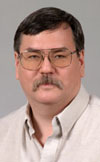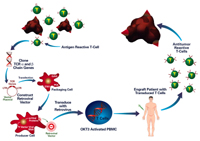|
|
|

|
SPOTLIGHT IN THE LAB
|
MUSC
resarcher develops novel immunotherapy to treat melanoma
What?
The development of a novel immunotherapy for melanoma invented by
MUSC’s Michael Nishimura, Ph.D., professor of surgery. Lentigen
Corporation, a biotechnology company specializing in the development
and manufacture of lentiviral gene delivery technologies, will be
collaborating with Nishimura.
The Need:
Melanoma is currently the sixth most common cancer in American men and
the seventh in American women. The incidence is increasing at a rate of
3-5 percent per year. Current therapies are unsatisfactory as
metastatic melanoma has a five-year survival rate of less than 10
percent, even after surgery.
The Researcher:
Nishimura said he was excited to learn in August of a National
Institutes of Health Small Business Innovation Research grant to fund
the program. It will allow them to test their therapeutic approach in a
Phase I clinical trial at MUSC.
 Dr. Michael
Nishimura Dr. Michael
Nishimura
“This grant will support an innovative gene therapy clinical trial we
developed for treating patients with advanced melanoma. It takes
advantage of the state-of-the-art Clean Cell Lab in the Center for
Cellular Therapy.
“In this trial, the patient’s T cells will be genetically engineered to
enable them to recognize their cancer cells. This is the first of many
clinical trials planned using this approach to treating patients with
melanoma and hepatocellular carcinoma.”
How it Works:
 It is based on
activation and targeting of a patient’s immune cells in the laboratory,
followed by reinfusion to attack the patient’s melanoma tumor cells. It is based on
activation and targeting of a patient’s immune cells in the laboratory,
followed by reinfusion to attack the patient’s melanoma tumor cells.
Specifically, the clinical collaboration will evaluate whether using
lentiviral-engineered T cells that express a high affinity T cell
receptor (TCR) capable of recognizing a melanoma/melanocyte tumor
antigen, will result in improved efficacy.
Potential Impact:
David Cole, M.D., professor and chairman, Department of Surgery, said
Nishimura deserves high praise for helping pioneer the
conceptualization and development of TCR-targeted immunotherapy.
“This type of approach holds incredible promise for not only the
treatment of cancer, but other diseases such as hepatitis. We are all
very excited that we now have clinical trials on the horizon.”
Related Links:
http://www.lentigen.com
Friday, Sept. 17, 2010
|
|
|




 It is based on
activation and targeting of a patient’s immune cells in the laboratory,
followed by reinfusion to attack the patient’s melanoma tumor cells.
It is based on
activation and targeting of a patient’s immune cells in the laboratory,
followed by reinfusion to attack the patient’s melanoma tumor cells.